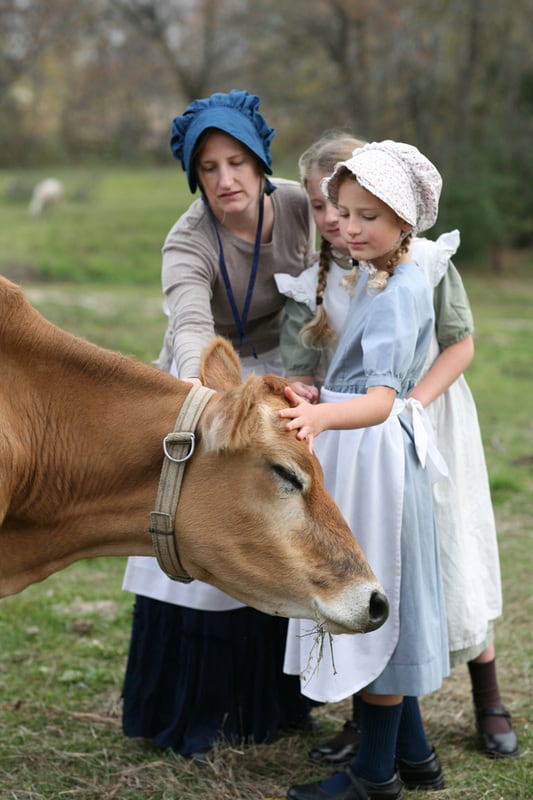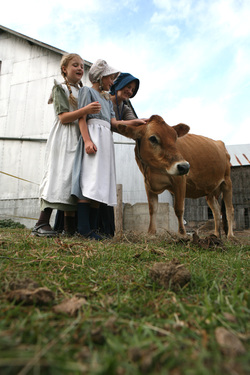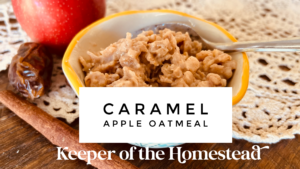You would be amazed at the amount of benefits that are contained in raw, unpasteurized milk from a grass fed animal. Grass fed is the key. Cows are ruminants which means that they are designed for eating grass in a field. Most factory farms feed cows a high amount of grains and soybeans which alter the chemical makeup of the milk that is produced. The byproduct then mimics the hormone estrogen which in turn causes children to mature physically at a much earlier age. Then, after the milk is heated and homogenized, it further alters the end product which is void of nutrition and filled instead with artificial hormones, steroids and antibiotics. It is best to not even consume milk that is sold in our markets. You should find a source of calcium elsewhere. Broccoli is high in calcium. All cows produce a protein call casein. One of the four proteins is called Beta Casein. There are two types of Beta Casein called A1 and A2. The black and white cows — Holsteins and Friesians — generally give milk that contains a significant amount of beta-casein type A1, which behaves like an opiate and which has been implicated in heart disease, Type 1 diabetes, autism and schizophrenia. Holsteins are the most popular cow in our dairy industry today because they have been bred to produce the most amount of milk than that of any other breed. When they have an unnatural diet of grains and are left in a manure laden pen, they are more than likely producing a very toxic and disease causing product. On the other hand, brown cow breeds like Jerseys, milking short horns, and guernseys (as well as goats and sheep) produce the A2 beta casein which is actually said to heal and strengthen your body. Cultures that consume a diet of raw A2 milk have been studied to show a significantly lower incidence of disease and malnutrition. They have shown that they have healthy bones and teeth as well.
RAW MILK FACTS:
-Raw cow’s milk has all 8 essential amino acids. Our bodies use amino acids as building blocks for protein. Lactoferrin, an iron-binding protein, improves absorption and assimilation of iron, anti-cancer properties and anti-microbial action against several species of bacteria responsible for dental cavities
-Carbohydrates: Lactose, or milk sugar, is the primary carbohydrate in cow’s milk.
-Raw milk contains bacterially-produced lactase, lipases and phosphatases which help break down starch, lactose (milk sugar), fat and phosphate compounds making milk more digestible and freeing up key minerals. Other enzymes, like catalase, lysozyme and lactoperoxidase help to protect milk from bad bacterial infections. Lactose intollerant people can consume raw grass fed A2 milk without a problem.
-Fats: About two thirds of the fat in milk is saturated. Saturated fats are actually very good for us as they help construct cell membranes and provide energy storage and insulation for delicate organs, as well as helping our bodies use fat-soluble vitamins. Raw milk from A2 grass fed cows also has a significant source of polyunsaturated Omega-6 fatty acid which has shown to lower food allergy reactions, strengthen your immune system, raise your metabolism which helps in losing unnecessary body fat and helps in building your muscles.
-Vitamins & Minerals: Raw milk contains a store house of water and fat soluble vitamins and trace minerals like calcium and phosphorus which can reduce cancer, lowers the risk of osteoporosis, lower risk of kidney stones, and produces strong teeth and bones.
-Enzymes and beneficial bacterial: Raw milk is loaded with good living enzymes and bacteria that help aid in digestion and assimilating vitamins, fats, sugars, proteins and minerals. They also protect your body from the bad bacteria.
Raw milk is a GOOD THING.
MAKE SURE YOU HAVE A GOOD, CLEAN GRASS FED A2 SOURCE!






4 thoughts on “Raw Grass Fed A2 Milk: God’s Perfect Food”
I got such good information on this topic, it’s a very interesting one.
Hello! I have a question. I was wondering what do you know about casein. I was told that my blood work show casein is too high. That I need to avoid dairy. Will using raw milk make a difference?
Thank you!
I have heard that it can, and it may be worth a try. You will know right away if it is a problem. If it seems not to agree with you, then you can discontinue.
Do you feed your cow hay in the winter? Does your cow eat anything else besides grass? Also, how do you know that they are not going to eat something that is not good for them or make the milk taste funny? Just curious. We are hoping for a cow one day but are still researching info. as we have no idea what owning a cow entails.